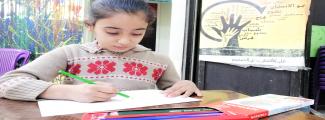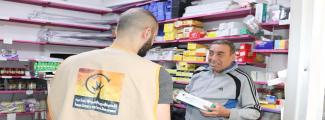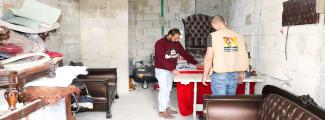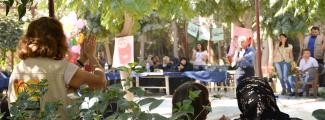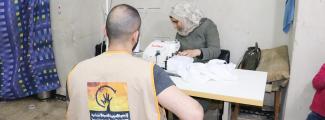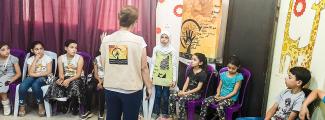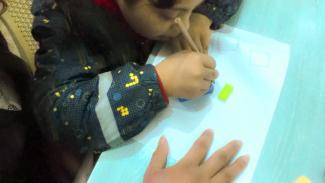We sometimes definitely need a dose of strength to change the reality that obstructs realizing out ambition
Ms. N.W., 25, married with a 5-year-old daughter and displaced from Eastern Ghouta, Beit Nayem, lives with her family in a rented house in Rural Damascus, Jaramana.
During the tours of the outreach volunteers in the area, while introducing the local community to the services provided by SSSD, they met Ms. N.W. and had a chat with her. Crying out her need of support, as she was living, in her own words, “in an extremely stressful situation” due to her husband’s daily abuse, ORVs invited her to register at the community center to receive the appropriate service.
When she came to the CC and explained her situation, she was referred to the Psychosocial Support Programme. After taking part in the SSSD women’s sessions for a while, N.W. was referred to the PSS case-manager, as well as to the GBV case-manager, who, in turn, proposed that she gets a startup small business grant—a sewing workshop—, as this would be likely to empower her, make her self-reliant and, at once, relieve the terrible stress she was experiencing.
Upon her consent, Ms. N.W. attended an entrepreneurship course where she learned how to manage a project, handle an accounts book, etc. The woman expressed her sheer delight with “so much self-confidence” she gained from the course and fellow participants.
After the training, she was interviewed by the UNHCR and SSSD SSBG officers and her project proposal was accepted.
Not long after she had launched her small business, we made a follow-up visit to the workshop she had rented. During the visit, and through the conversation with her, the financial stability of the business was obvious. She told us that she was able to network with some school outfitters, so she could supply them with some of their needs in terms of modeling and sewing. She further said she was now able to secure a kindergarten premium for her daughter to learn and stay in a safe place during her working hours, which gave her inner comfort and peace.
In her own words,
“Whatever I say will fall short… I’m now able to depend on myself, be independent financially and morally, and therefore take the step of filing for divorce… I rented a house on my own. Work is good, and both my mother and I are working in the workshop. She also can buy the medicine for my sick father. This small business is like a weapon that made me stronger, more self-confident, so that I could change my circumstances for a more secure and stable life and, at the same time, help my parents…”

